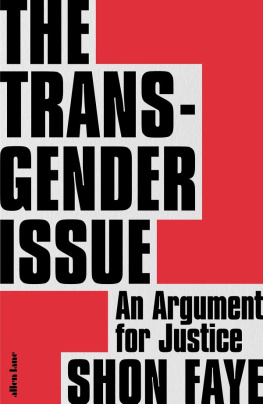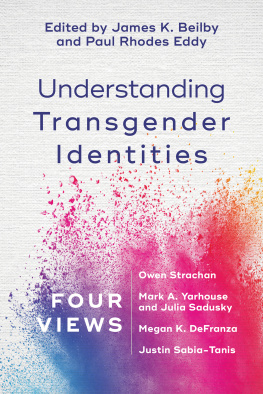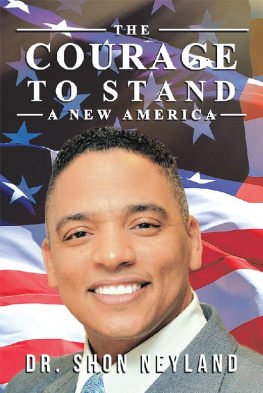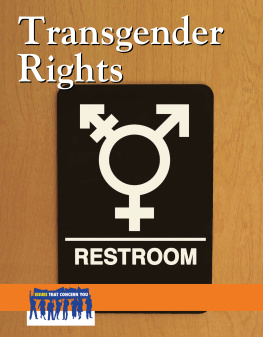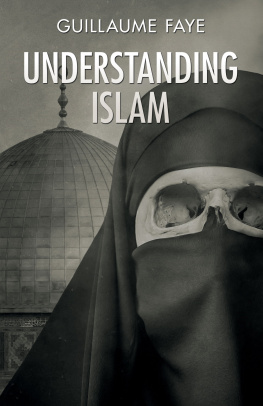Shon Faye - The Transgender Issue
Here you can read online Shon Faye - The Transgender Issue full text of the book (entire story) in english for free. Download pdf and epub, get meaning, cover and reviews about this ebook. year: 2021, publisher: Penguin Books Ltd, genre: Politics. Description of the work, (preface) as well as reviews are available. Best literature library LitArk.com created for fans of good reading and offers a wide selection of genres:
Romance novel
Science fiction
Adventure
Detective
Science
History
Home and family
Prose
Art
Politics
Computer
Non-fiction
Religion
Business
Children
Humor
Choose a favorite category and find really read worthwhile books. Enjoy immersion in the world of imagination, feel the emotions of the characters or learn something new for yourself, make an fascinating discovery.
The Transgender Issue: summary, description and annotation
We offer to read an annotation, description, summary or preface (depends on what the author of the book "The Transgender Issue" wrote himself). If you haven't found the necessary information about the book — write in the comments, we will try to find it.
The Transgender Issue — read online for free the complete book (whole text) full work
Below is the text of the book, divided by pages. System saving the place of the last page read, allows you to conveniently read the book "The Transgender Issue" online for free, without having to search again every time where you left off. Put a bookmark, and you can go to the page where you finished reading at any time.
Font size:
Interval:
Bookmark:


Contents
Shon Faye was born in Bristol, and is now based in London. After training as a lawyer, she left the law to pursue writing and campaigning, working in the charity sector with Amnesty International and Stonewall. She was an editor-at-large at Dazed, and her writing has been published by the Guardian, the Independent and Vice, among others. Faye recently launched an acclaimed podcast series, Call Me Mother, interviewing trailblazing LGBTQ elders. This is her first book.
This book is dedicated to my mother, in a frankly insufficient attempt to reciprocate her dedication to me.
When I say trans, I also mean escape. I mean choice. I mean autonomy. I mean wanting something greater than what you told me. Wanting more possibilities than the one you forced on me.
Travis Alabanza

The liberation of trans people would improve the lives of everyone in our society. I say liberation because I believe that the humbler goals of trans rights or trans equality are insufficient. Trans people should not aspire to be equals in a world that remains both capitalist and patriarchal and which exploits and degrades those who live in it. Rather, we ought to seek justice for ourselves and others alike.
Trans people have endured over a century of injustice. We have been discriminated against, pathologized and victimized. Our full emancipation will only be achieved if we can imagine a society that is completely transformed from the one in which we live. This book is primarily concerned with explaining how society, as it is currently arranged, often makes trans peoples lives unnecessarily difficult. Yet, in posing solutions to these problems, it does not limit itself to thinking solely about trans people, but also encompasses anyone who is routinely disempowered and dispossessed.
Full autonomy over our bodies, free and universal healthcare, affordable housing for all, power in the hands of those who work rather than those privileged few who extract profit from our vastly inequitable system, sexual freedom (including freedom from sexual violence) and the end to the mass incarceration of human beings are all crucial ingredients in the construction of a society in which trans people are no longer abused, mistreated or subjected to violence. Such systemic changes would also particularly benefit everyone else forced to the margins of society, both in the UK and across the world.
The demand for true trans liberation echoes and overlaps with the demands of workers, socialists, feminists, anti-racists and queer people. They are radical demands, in that they go to the root of what our society is and what it could be. For this reason, the existence of trans people is a source of constant anxiety for many who are either invested in the status quo or fearful about what would replace it.
In order to neutralize the potential threat to social norms posed by trans peoples existence, the establishment has always sought to confine and curtail their freedom. In twenty-first-century Britain, this has been achieved in large part by belittling our political needs and turning them into a culture war issue. Typically, trans people are lumped together as the transgender issue, dismissing and erasing the complexity of trans lives, reducing them to a set of stereotypes on which various social anxieties can be brought to bear. By and large, the transgender issue is seen as a toxic debate, a difficult topic chewed over (usually by people who are not trans themselves) on television shows, in newspaper opinion pieces and in university philosophy departments. Actual trans people are rarely to be seen. This book intentionally and deliberately reappropriates the phrase transgender issue, in order to outline the reality of the issues facing trans people today, rather than as they are imagined by people who do not face them.
In doing so, this book takes a wide-ranging look at different aspects of trans experience. The introduction looks at the ways in which the media has warped and distorted the conversation around trans people in Britain. The first chapter is a broad survey of everyday trans life, in family relationships, education and housing, from childhood to old age. The second chapter moves to one of the most specific areas of trans oppression, examining healthcare and the denial of bodily autonomy.
While trans peoples rights are often considered a liberal human rights issue, and liberals tend to argue for trans equality as a matter of individual freedom, trans people endure incessant focuses on the political struggle of trans sex workers.
Discrimination and violence against trans people arent always interpersonal. State violence the states monopoly on legal force through policing, prisons and migrant detention centres, and its consequent power to restrict trans people from moving freely in public spaces with privacy and dignity is examined in the fifth chapter.
In this struggle for freedom from oppression and violence, trans people often fight alongside other marginalized people. However, the relationship between trans people and lesbians, gay men and bisexual people and the feminist movement are the subject of much controversy, both historically and in our present times. Greater acknowledgement of gender variance in the twenty-first century has led to wider recognition of the fact that the spectrum of human sexuality is much more complex and less rigid than previously thought, which can and does unsettle some people. This disquiet is exploited by conservatives and religious groups whose aim is to undermine LGBTQ+ power by promoting in-fighting. Similarly, the common fight against the oppression of women can all too frequently beome mired in anxiety over who should even be included in the category of woman. In this book, however, I argue in the final chapters that the central demands of trans liberation are not merely aligned with, and no threat to, gay rights and feminism, but are synonymous with the goals of those movements.
When writing about trans people, it is still customary to explain what trans itself means. This in itself is telling. Despite all the headlines and media coverage, most people who dont know a trans person would struggle to define the term. In general, there are a few aspects of trans terminology that often confuse people new to the topic. One is that trans politics uses umbrella terms for convenience that is, using one word to describe a vast range of very different experiences or identities. Another is that the language evolves so rapidly that specialist terms commonly used even five years previously soon become redundant through changes in linguistic fashion and in society or simply through the development of new perspectives that change the way language is used. Much of the contemporary jargon associated with trans campaigning, politics and identity originated on the internet; thus it can surge and fade in popularity very quickly. In what follows, Ive tried to make my own language as clear as possible, while accepting the risk that my terminology may seem dated in a few years time.
Next pageFont size:
Interval:
Bookmark:
Similar books «The Transgender Issue»
Look at similar books to The Transgender Issue. We have selected literature similar in name and meaning in the hope of providing readers with more options to find new, interesting, not yet read works.
Discussion, reviews of the book The Transgender Issue and just readers' own opinions. Leave your comments, write what you think about the work, its meaning or the main characters. Specify what exactly you liked and what you didn't like, and why you think so.

